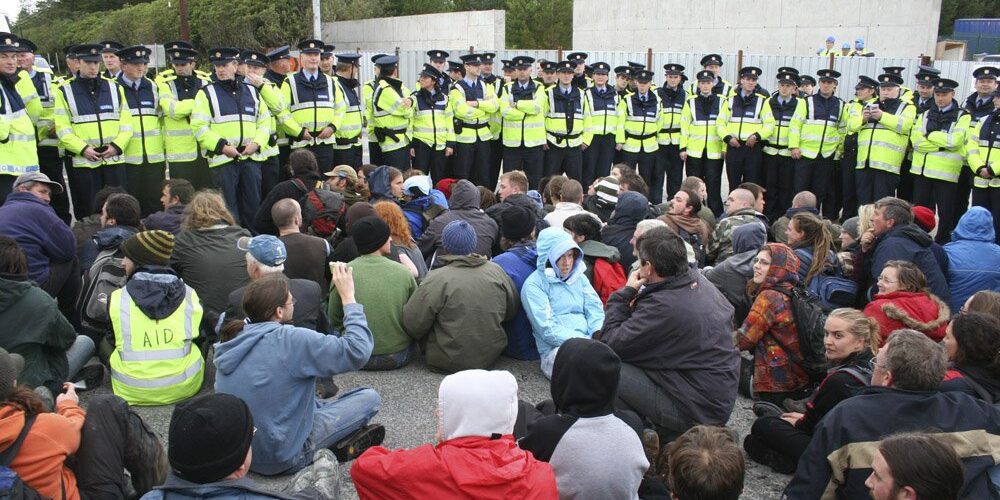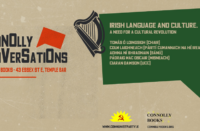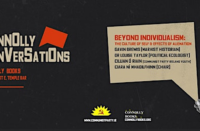After the discovery of natural gas in Kinsale by Marathon Oil in 1971, the Resources Protection Campaign was founded by several groups, including the Communist Party of Ireland (CPI). Under public pressure for Irish natural resources to be used for the benefit of the Irish people, the Irish National Petroleum Corporation was formed in 1979 as a state-owned company. However, the interests of the Irish ruling class has always rested on protecting profit-margins of monopoly capital abroad.
The Shell to Sea campaign emerged in 2005, after the discovery of gas in Corrib, Co. Mayo, in 1996, near the local village of Rossport. Shell’s cost-saving measures caused alarm in the local community, which began to organise. Anti-Shell protesters were, on several occasions, attacked by Gardaí assisting Shell’s private security forces, showing the repressive apparatus of the gombeen state in action. Not unlike the response of the state’s police force in protecting landlords evicting tenants in more recent years.
In 2000, a former Irish director of Statoil Exploration in Ireland stated that no other country in the world had given such favourable terms to oil companies as Ireland, with the contracts negotiated by the Irish state generating, at best, only 7% of the revenue gained by the sale of Irish resources. This is despite Irish oil & gas reserves possible being worth over 730 billion euro. 95% of Ireland’s natural gas is imported from Scotland.
Since 2009, the 26 counties has the most expensive electricity prices in Europe, with people in this state paying more than 700 euro more than the EU average. In 2002, Ireland had the lowest electricity prices in the EU. While the ESB is still publicly-owned, the EU imposed policies aimed at preventing state aid in the energy market and urged the Irish government to allow more market competition, reducing the ESB’s market share from 100% to 41%.
Some other examples of privatisation of formerly state-owned companies in Ireland include Irish Sugar, now Greencore, in 1991; Irish Steel in 1996 (closed down in 2001); Aer Lingus, in phases between 2006-2015, now owned by International Airlines Group (IAG) and Eircom in 1999, now Eir. This is in keeping with the wishes of the European Union, including various of its treaties which keep the Irish government committed to ensuring profit for the private sector against the wishes and interests of the Irish people, who are not benefiting from the privatisation of their assets.
A note of caution must be expressed about the difference between social ownership, i.e. for the people’s benefit, and state ownership, for the purposes of managing capitalism. When the Irish state covered 64 billion euro in debt for the nationalisation of banks such as AIB and Bank of Ireland, it was not something to celebrate. What were private debts became public, as the state scrambled to protect the ruling class, taking on a total of 42% of the EU’s total banking debt to do so, while slashing public pay and social allowances in so-called austerity measures. When the banks were making record profits during the Celtic Tiger, there was no chance of nationalisation.
A key target of cutbacks was the health service, with healthcare staff facing the brunt of lack of state investment. After the outbreak of Covid-19 in 2020, the Irish government made the decision to lease private hospital beds. The HSE paid for the full cost in what was essentially a market transaction, despite some naively believing early on that the Irish government were looking like nationalising the private health sector. In fact, private hospital owners, such as billionaires Denis O’Brien and Larry Goodman, were paid 115 million euro a month by the state during the Covid-19 pandemic. We can also add the Irish government giving landlords billions of euro in schemes such as the Housing Assistance Payment (HAP).
The Irish state is very much interfering in the economy. It subsidises private profit through billions a year, while scapegoating welfare recipients. The state also allows multi-national corporations to pay minimal tax, as we saw in the recent Apple ruling. This is Capitalism. There are questions for any Marxist to any answer on how much public ownership is needed in a socialist economy. No state has purely 100% public ownership, with economic reforms seen in countries such as Cuba and DPR Korea. In China, Vietnam, Laos, the state exercises public ownership strategically, allowing the market but with key sectors, energy, finance, communications, military, media, heavy industry, being publicly owned.
Public ownership is key in protecting national sovereignty and in providing for effective planning to meet the needs of the future. The Irish state, through its pro-market, pro-profit approach, has left us with a disastrous housing emergency, a crumbling health service and incompetent and overpaid upper-management in state bodies. We also have a sort of “soft privatisation”, where services previously done by the likes of council workers are left to volunteer groups to do.
In the words of Pádraig Pearse: “the nation’s sovereignty extends not only to all the material possessions of the nation, the nation’s soil and all its resources, all wealth and all wealth-producing processes within the nation.”






